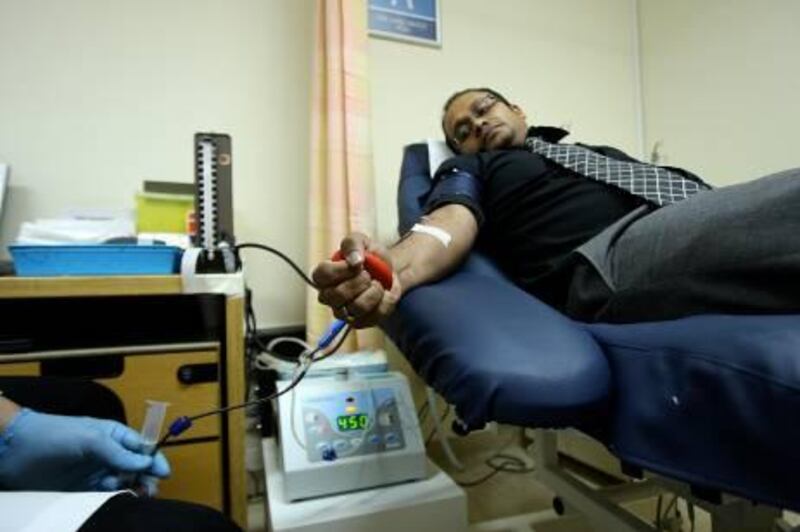ABU DHABI // Only one in 20 blood donations in the UAE comes from a woman - and doctors blame a lack of awareness of the causes of iron deficiency.
About 30 per cent of volunteers are women but most are rejected, said Nida'a, a lab technician at the Abu Dhabi Blood Bank.
MORE UAE NEWS: Our pick of today's top local news stories
Last Updated: June 14, 2011
Buses collide causing Sheikh Zayed Road gridlock ASchool bus and labourers' bus collide on the southbound carriageway of Sheikh Zayed Road near Dubai Media City. Read article
Fuel shortage may bring power cuts, residents fear Northern Emirates residents worry that electrical and petrol shortages may cause problems as the summer heat sets in. Read article
Meat inspectors to use new tools to ensure food safety Food inspectors are to use new equipment to help uncover impurities and poor storage and handling. Read article
Two Ajman-based Iraqi students on terrorism charges Charges laid after two allegedly sent pens with concealed cameras to their homeland. Read article
[ MORE UAE NEWS ]
Technicians check each potential donor's weight, height, blood pressure, temperature, pulse and blood haemoglobin level.
The men are fine - "we usually are able to take blood from all of the men", said Nida'a - but the women are not. Barely one in three has 12.5g or more of haemoglobin for every 100ml of blood, the minimum required.
"We always find that women's haemoglobin levels, or the amount of iron in the blood, is much lower than men and much lower than our minimum requirements," said Nida'a.
There are medical reasons for this. Menstruation, ovulation, breastfeeding and pregnancy can all severely lower iron levels in the blood.
But Dr Ahmad al Emam, a blood diseases specialist at the Abu Dhabi Blood Bank, said women were also dieting to lose weight, usually without ensuring their nutritional needs were met.
The tendency towards large families also has an impact. Some 93 per cent of all donors in the UAE are aged between 18 and 44.
"Women who have consecutive pregnancies, which is typical in our Arab culture, don't allow their blood to recover after delivering before they conceive again, and that means they are usually borderline anaemic without even knowing it," Dr al Emam said.
The phenomenon is not confined to the UAE. Figures released by the World Health Organisation (WHO) to mark World Blood Donor Day today show women in all of the Arab countries surveyed donate a lot less than men.
Women account for just 8 per cent of blood donors in Kuwait, 7 per cent in Oman, 5 per cent in Bahrain, 4 per cent in Qatar and 3 per cent in Jordan and Yemen.
By contrast, 50 per cent of donors in the US and Australia are women, 49 per cent in the UK and 47 per cent in France.
"These figures are really not surprising considering the cultural differences between an Arab woman and a western woman," said Dr Iman al Jabi, a consultant family doctor at a private clinic in Jordan.
Dr al Jabi attributed this in part to the Arab habit of drinking tea soon after a heavy meal.
"Black tea lowers the absorption of iron in the blood, which is why it should never be given to children and why it should never be consumed immediately after food," she said.
Arab women also tend to prefer intra-uterine devices - the coil - as their method of birth control, according to Dr al Jabi and Dr Bashar Abduh, a specialist gynaecologist and obstetrics doctor at Al Noor Hospital.
But the small, T-shaped plastic devices, which can stay in the uterus for up to 10 years, have an important health consequence for blood donation.
"One side effect of these intra-uterine devices is that they increase the blood flow during a period and so increase iron deficiency," said Dr Abduh.
There are no official numbers, but while only 2 per cent of women on contraceptives in the US use a coil, Dr Abduh suggested its use was far more prevalent among Arab women. Dr al Jabi said it was her patients' number one choice.
Women also often do not realise menorrhagia, or heavy and prolonged periods, is a condition that requires medical attention.
"Women who are obese also have heavy bleeding and they think this is perfectly normal, so they don't mention it to their doctors and don't get treatment for it," said Dr Abduh. "Meanwhile, they are anaemic and don't even know it."
The answer, said Dr al Emam, was education and awareness.
"We'd love to be able to take blood from our female volunteers but most of the time they are surprised to learn that their haemoglobin is low," he said.
Dr Abduh said Arab women were often disinclined to take supplements and, in general, lack awareness of the importance of taking iron pills.
"Western girls start taking iron as a supplement as soon as they reach puberty," he said.
"Meanwhile, I get newlywed women in my clinic who want to get pregnant, who have a haemoglobin count of seven or eight, and don't see why they need a supplement."





